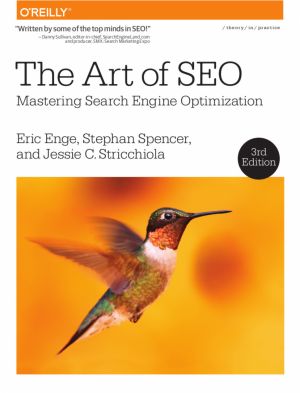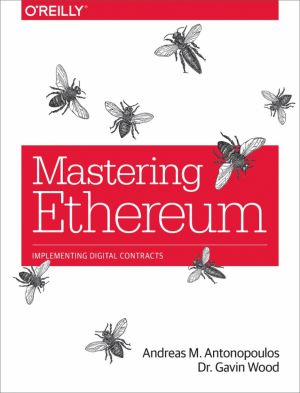Mastering Ethereum
Building Smart Contracts and DApps
by Andreas M. Antonopoulos, Gavin Wood
DescriptionTable of ContentsDetailsHashtagsReport an issue
Discover why IBM, Microsoft, NASDAQ, and hundreds of other organizations are experimenting with Ethereum. This essential guide shows you how to develop the skills necessary to be an innovator in this growing and exciting new industry.
- Run an Ethereum client, create and transmit basic transactions, and program smart contracts;
- Learn the essentials of public key cryptography, hashes, and digital signatures;
- Understand how "wallets" hold digital keys that control funds and smart contracts;
- Interact with Ethereum clients programmatically using JavaScript libraries and Remote Procedure Call interfaces;
- Learn security best practices, design patterns, and anti-patterns with real-world examples;
- Create tokens that represent assets, shares, votes, or access control rights;
- Build decentralized applications using multiple peer-to-peer (P2P) components. 






Book Description
Ethereum represents the gateway to a worldwide, decentralized computing paradigm. This platform enables you to run decentralized applications (DApps) and smart contracts that have no central points of failure or control, integrate with a payment network, and operate on an open blockchain. With this practical guide, Andreas M. Antonopoulos and Gavin Wood provide everything you need to know about building smart contracts and DApps on Ethereum and other virtual-machine blockchains.Discover why IBM, Microsoft, NASDAQ, and hundreds of other organizations are experimenting with Ethereum. This essential guide shows you how to develop the skills necessary to be an innovator in this growing and exciting new industry.
- Run an Ethereum client, create and transmit basic transactions, and program smart contracts;
- Learn the essentials of public key cryptography, hashes, and digital signatures;
- Understand how "wallets" hold digital keys that control funds and smart contracts;
- Interact with Ethereum clients programmatically using JavaScript libraries and Remote Procedure Call interfaces;
- Learn security best practices, design patterns, and anti-patterns with real-world examples;
- Create tokens that represent assets, shares, votes, or access control rights;
- Build decentralized applications using multiple peer-to-peer (P2P) components.
This open book is licensed under a Creative Commons License (CC BY-NC-ND). Free download in PDF format is not available. You can read Mastering Ethereum book online for free.
Table of Contents
Chapter 1
What Is Ethereum?
Chapter 2
Ethereum Basics
Chapter 3
Ethereum Clients
Chapter 4
Cryptography
Chapter 5
Wallets
Chapter 6
Transactions
Chapter 7
Smart Contracts and Solidity
Chapter 8
Smart Contracts and Vyper
Chapter 9
Smart Contract Security
Chapter 10
Tokens
Chapter 11
Oracles
Chapter 12
Decentralized Applications (DApps)
Chapter 13
The Ethereum Virtual Machine
Chapter 14
Consensus
Appendix A
Ethereum Fork History
Appendix B
Ethereum Standards
Appendix C
Ethereum EVM Opcodes and Gas Consumption
Appendix D
Development Tools, Frameworks, and Libraries
Appendix E
web3.js Tutorial
Book Details
Title
Mastering Ethereum
Subject
Computer Science
Publisher
O'Reilly Media
Published
2018
Pages
424
Edition
1
Language
English
ISBN13 Digital
9781491971949
ISBN10 Digital
1491971940
License

Related Books

Mastering Dyalog APL is a complete guide to the use of Dyalog, beginning with a thorough introduction to the APL programming language. Following this, the tutorial describes a large number of common coding techniques and discusses a variety of interfaces, including file handling and COM/OLE. Bernard Legrand provides a comprehensive introduction to ...

This book contributes to the creation of a cyber ecosystem supported by blockchain technology in which technology and people can coexist in harmony. Blockchains have shown that trusted records, or ledgers, of permanent data can be stored on the Internet in a decentralized manner. The decentralization of the recording process is expected to signific...

A deep learning is of great interest these days, the crucial necessity for rapid and optimized implementation of the algorithms and designing architectures is the software environment. TensorFlow is designed to facilitate this goal. The strong advantage of TensorFlow is it flexibility is designing highly modular model which also can be a disadvanta...

Karl Seguin is a developer with experience across various fields and technologies. He's an expert .NET and Ruby developer. He's a semi-active contributor to OSS projects, a technical writer and an occasional speaker. With respect to MongoDB, he was a core contributor to the C# MongoDB library NoRM, wrote the interactive tutorial mongly as...

Author Emanuele DelBono guides readers along the first steps of mastering the Elixir programming language in Elixir Succinctly. Providing a brief overview of Elixir's history and purpose and clear instructions to create an app with Elixir, DelBono makes it easy for developers who wish to add a new language to their repertoire....

Three acknowledged experts in search engine optimization share guidelines and innovative techniques that will help you plan and execute a comprehensive SEO strategy. Complete with an array of effective tactics from basic to advanced, this third edition prepares digital marketers for 2016 with updates on SEO tools and new search engine optimization ...

